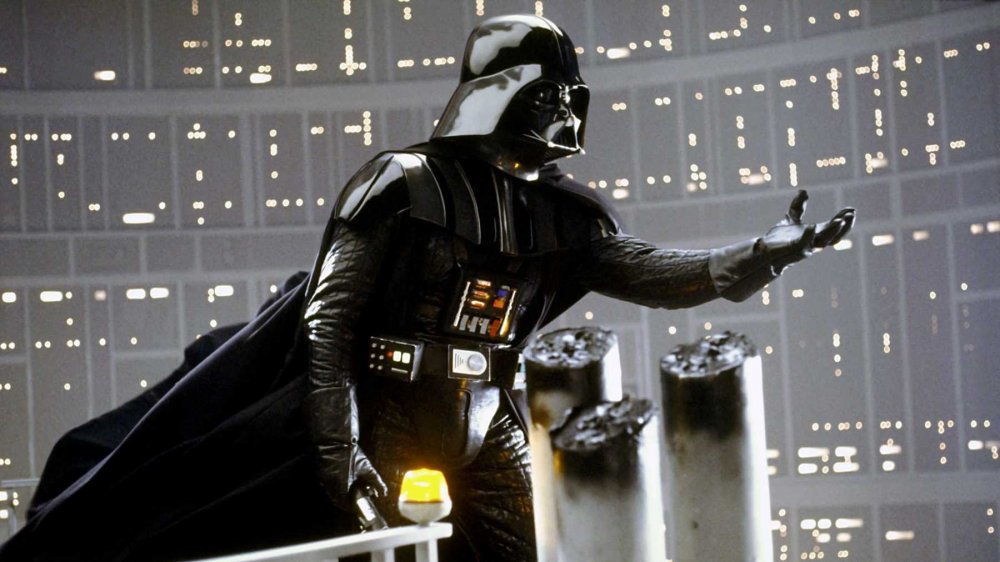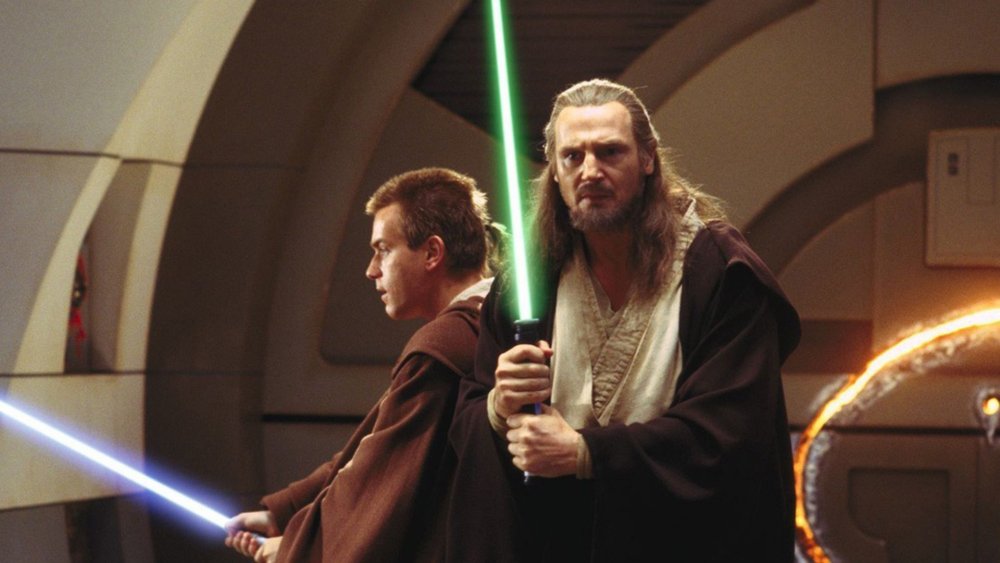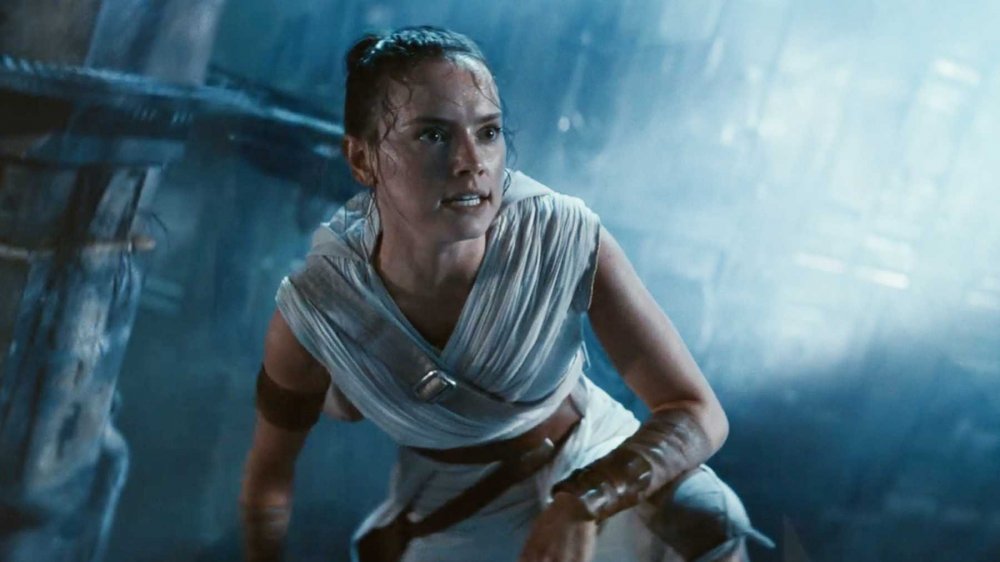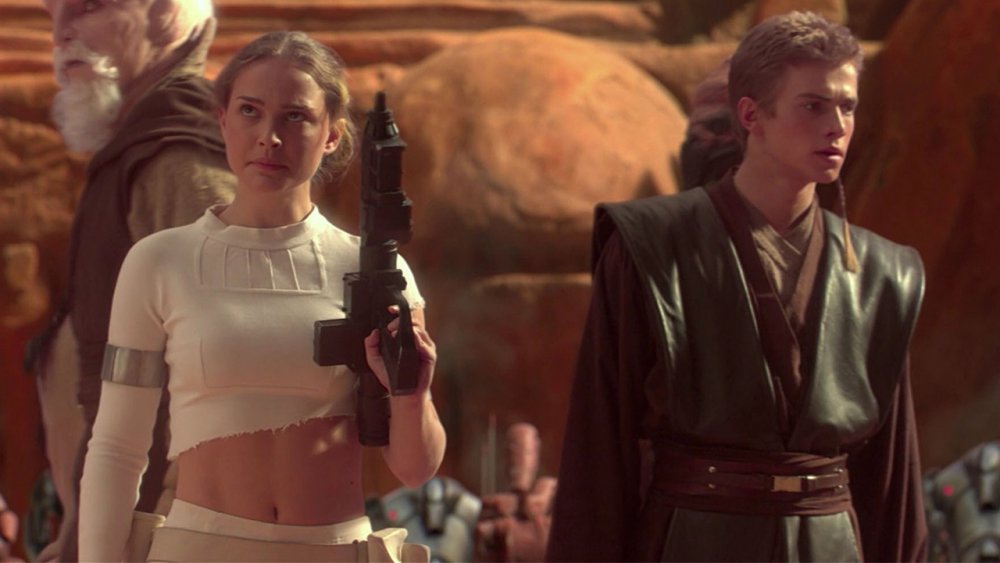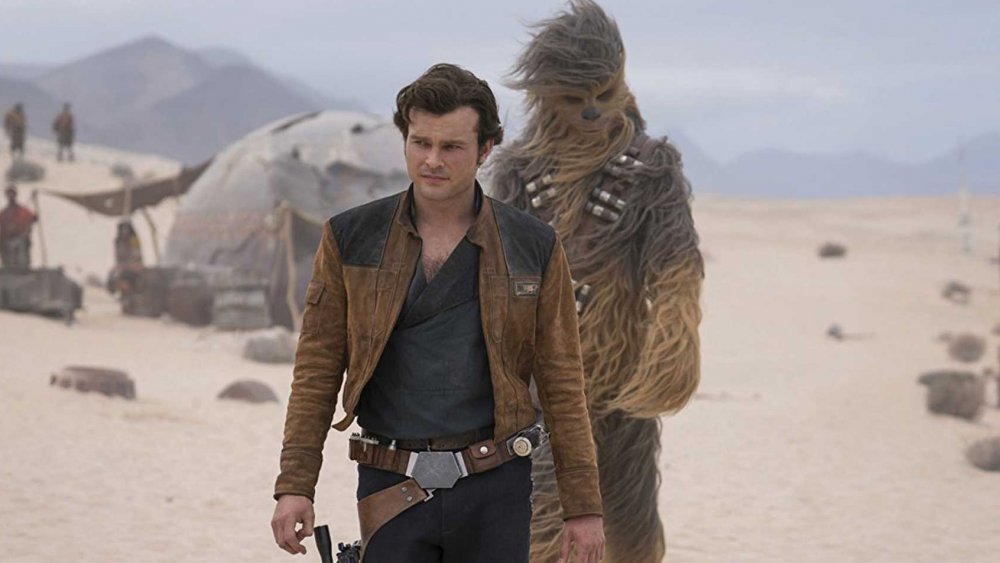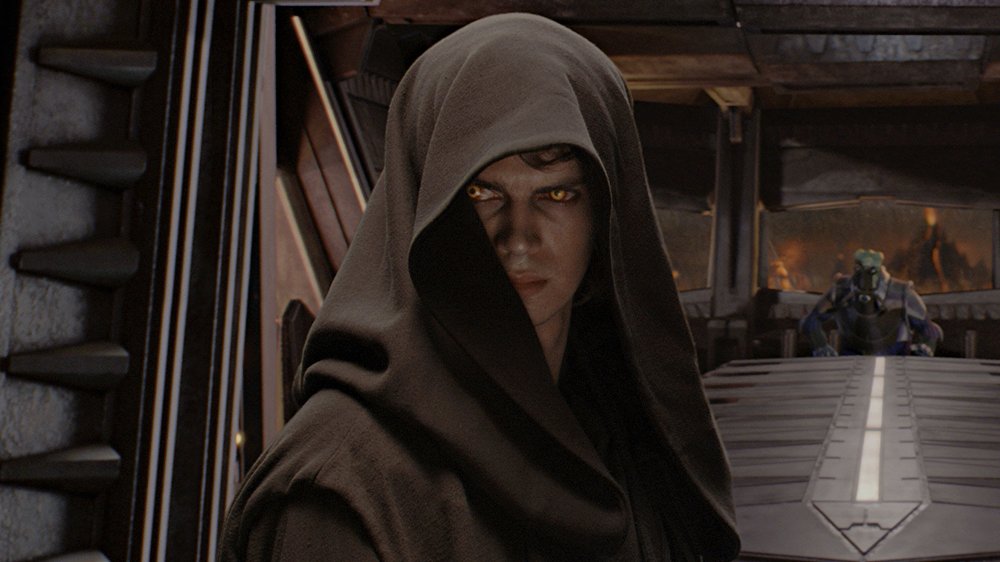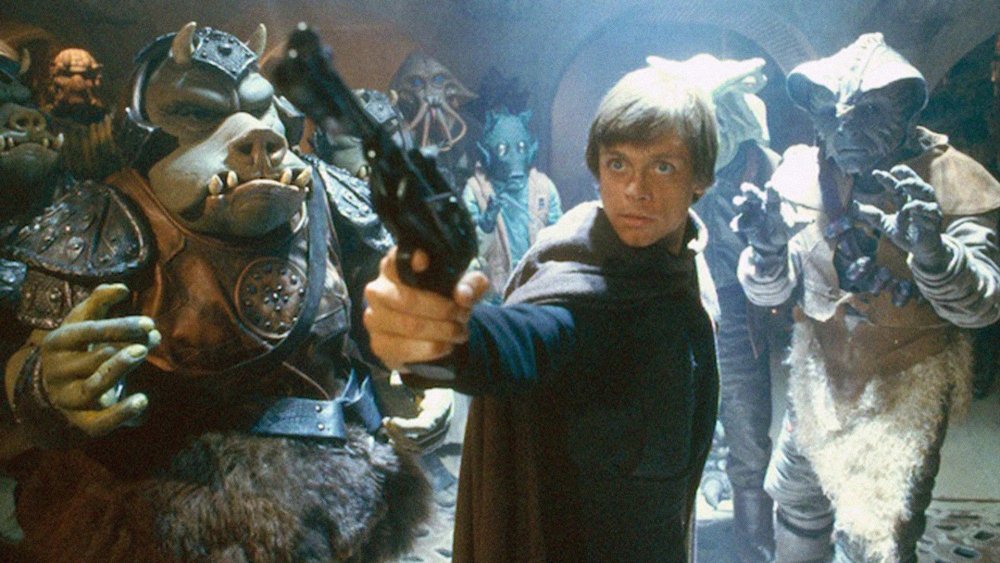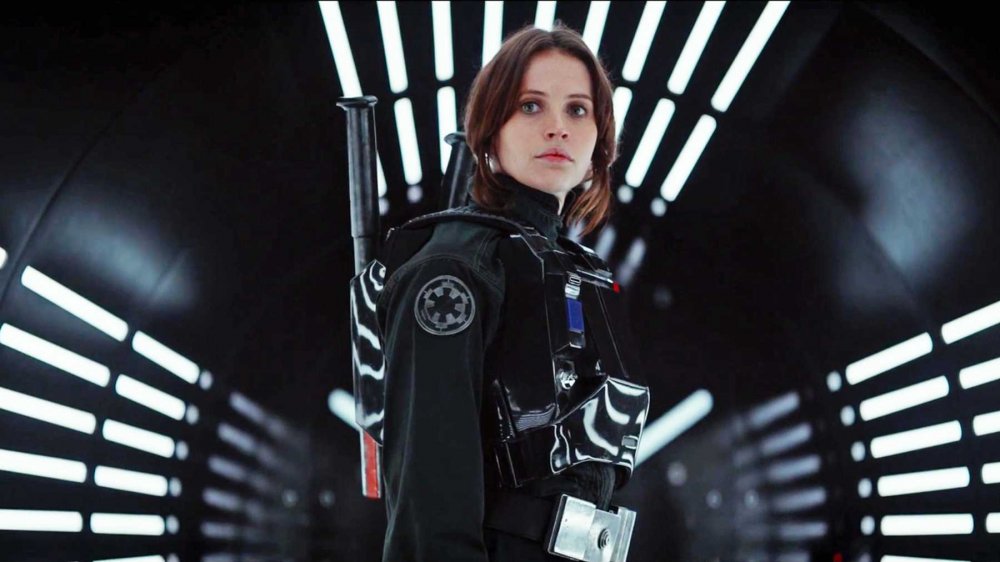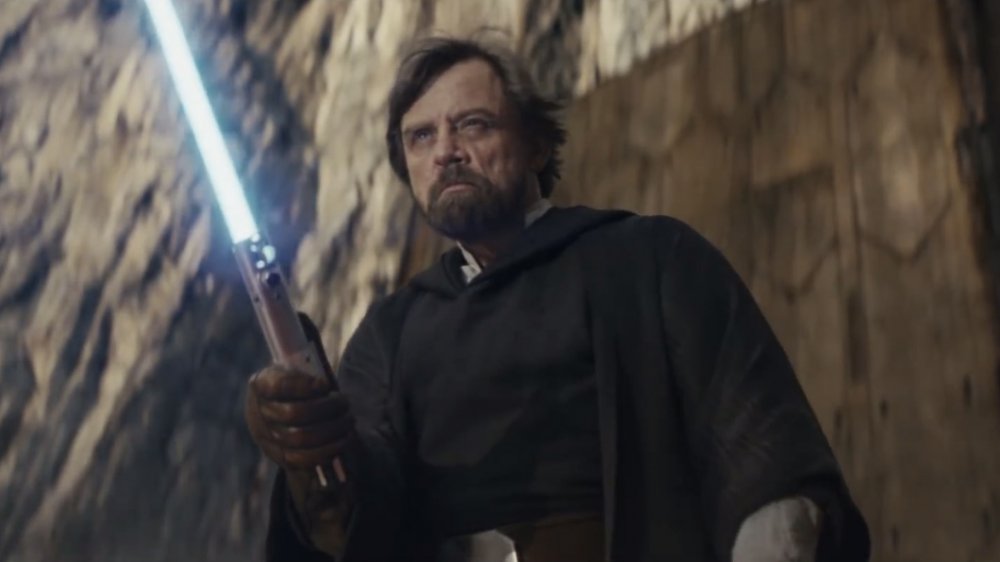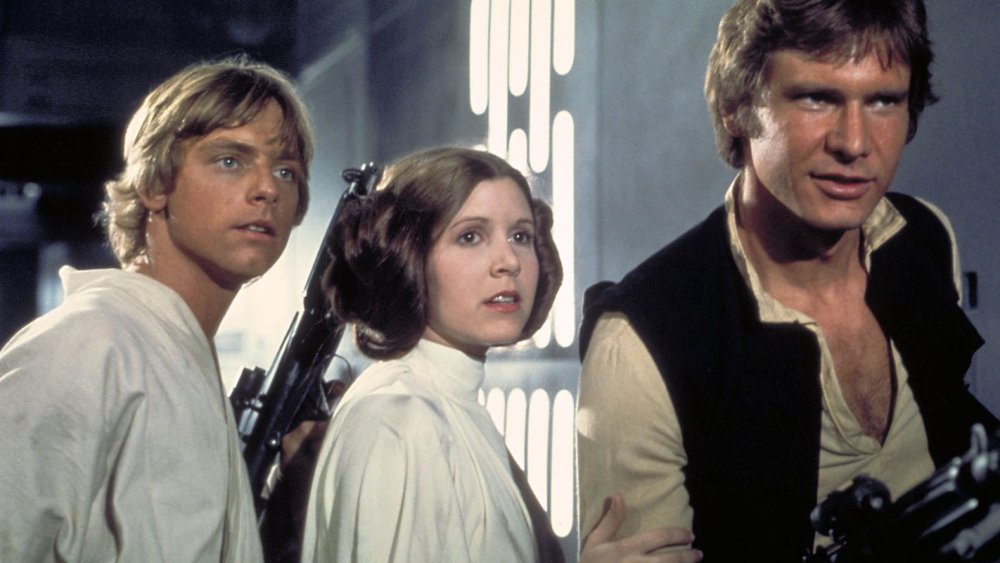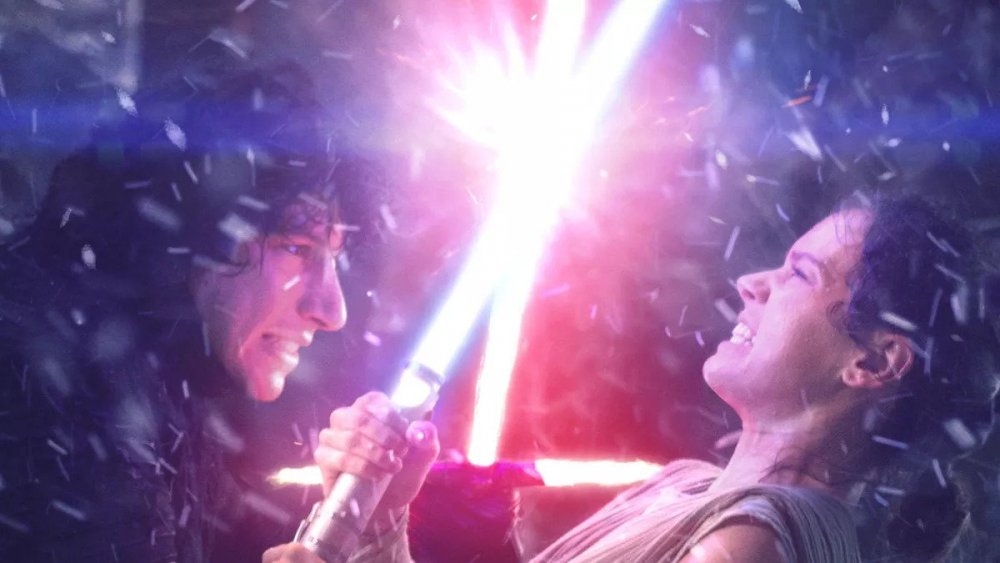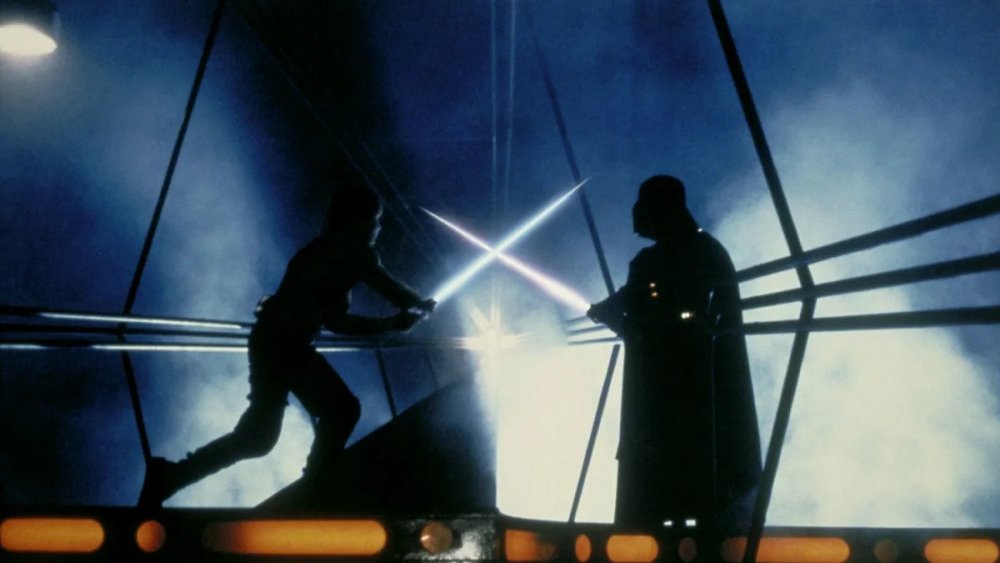Star Wars Movies Ranked Worst To Best By Rotten Tomatoes Scores
The nine-film Skywalker Saga has finally come to a conclusion with Star Wars: Episode IX – The Rise of Skywalker, and in the series' 42-year history, we've gotten some pretty great stories and, well, some not-so-great ones. While the original trilogy is to this day held in high esteem among fans, the prequel films remain some of the more blatant examples of the muddled, unsatisfying storytelling that the franchise is at times capable of — and as far as the sequel films go, pretty much the only thing the fandom can agree on is that there can be no agreement.
Those nine movies, plus a couple of interesting and ambitious standalone stories, comprise one of the most financially successful, culturally impactful film series of all time. Rise of Skywalker, though, was seen by many critics as having failed to give the series the sendoff that it deserved. This got us thinking: how do these eleven movies stack up against each other in the eyes of the professionals? We consulted the expert, review aggregator Rotten Tomatoes, to find out — and we put together a list that will contain a few surprises.
Star Wars: Episode I - The Phantom Menace — 53%
In 1999, fans were absolutely thrilled when Star Wars creator George Lucas returned after a 17-year absence to give us The Phantom Menace, the first entry in the prequel trilogy that he'd long talked about, but that we weren't sure we would ever get. At least, they were thrilled until they actually saw the film; as much as they tried to love it, there were a few problems that just couldn't be ignored. Problems like glacial pacing, Lucas' signature clunky dialogue, and one of the silliest, most distracting characters (Jar Jar Binks, of course) in Star Wars history.
Most reviewers felt no obligation to even try to embrace a film which many felt committed an unforgivable sin: being boring. Penning his review in the form of a droll Q&A, Wall Street Journal's Joe Morgenstern took the film to task for getting bogged down in politics when what we really wanted were, oh, say, more lightsaber battles. "What I can't comprehend is why the political details had to be so tedious and abstract," he wrote. "Will the kids of our nation and the world truly be titillated by trade wars and the spectacle of a do-nothing Senate?" It was a common complaint, as was the fact that that dialogue was just downright difficult to listen to without stifling derisive laughter. "[The film] — a combination of discussions about trade blockades, Ian McDiarmid's Senator Palpatine looking sinister and Jake Lloyd's Anakin Skywalker shouting 'Yippeee!' — just about hangs together with some truly dreadful dialogue," wrote Ivan Radford of CineVue. "If you can peel back the layers of gimmicks and bad dialogue far enough, you can still find some of that old Star Wars — it's just a shame that it'll cost you so much to enjoy it."
Despite the presence of a thrilling pod race and one epic three-way lightsaber fight, The Phantom Menace proved to be a disappointing start to a trilogy that many fans would just as soon have done without.
Star Wars: Episode IX - The Rise of Skywalker — 58%
Perhaps the only thing more disappointing than an unsatisfying beginning is a sloppy conclusion, and unfortunately, a great many critics were of the opinion that this is exactly what The Rise of Skywalker provided. Failing to take the chances that defined its predecessor, 2017's The Last Jedi, was its major offense — but it certainly wasn't its only one.
"All the elements are there," wrote the Chicago Tribune's Katie Walsh, "it's the execution that fails The Rise of Skywalker, which is a harried and hectic affair. [Director J.J.] Abrams hits the gas on this space race right away and never pauses to let a single emotion land, because the characters are too busy scrambling around the galaxy looking for thingamajigs and each other. The pace and volume of plot is punishing, and numbing."
The film's willingness to actually undo what was done by The Last Jedi, which famously divided fandom, was seen as another major flaw. "I'm genuinely stunned that not only did [Abrams] learn nothing from the risks taken by [Last Jedi director] Rian Johnson, but also that Abrams, in some cases, actively attempts to dismantle some of Johnson's boldest choices," wrote Third Coast Review's Steve Prokopy, "choices that needed to be made, if only to breathe some fresh air into this virtually lifeless nostalgia corpse."
It's tough to believe that the hotly-anticipated Rise of Skywalker failed to procure a Rotten Tomatoes score that was at least better than the film many fans consider to be the worst of the much-maligned prequel series... and yet, here we are.
Star Wars: Episode II - Attack of the Clones — 65%
Attack of the Clones was a film focusing on the would-be epic love story between Anakin Skywalker (Hayden Christensen) and Padme Amidala (Natalie Portman) — a story that brought the movie screeching to a halt every time the two characters were onscreen. Their appalling lack of chemistry was only part of the problem, as Lucas' dialogue has never been more jarringly bad — but some reviewers found the movie to be redeemed by what were admittedly some crackerjack action sequences sprinkled throughout.
"Assigned to protect [Amidala], former Queen and now Senator of the peace-loving planet Naboo, [Skywalker] breaks the Jedi code by falling in love with her, though no amount of frolicking and flowery dialogue can get those feelings across," wrote Scott Tobias of AV Club. "Save for a crowd-pleasing moment with Yoda, the movie remains pretty and inert, with no authentic emotion, no cumulative power." Wall Street Journal's Morgenstern echoed this assessment while just drilling Lucas for his writing: "You can't blame actors, particularly young ones, when the words put in their mouths are almost unspeakable... and the direction seems to suck them dry of energy or spontaneity," he wrote.
Some observers, though, were able to look past the wooden acting and inauthentic love story to credit Lucas with crafting a solid film in terms of sheer spectacle. "I love this movie because it gives me what I've been looking for my entire life... all the things I've only dreamt of since I first saw Luke fly down that Death Star trench to glory," wrote Joshua Tyler of CinemaBlend. "In the end, Attack of the Clones pulls its ass out of the fire and delivers the kind of Star Wars adventure we've all really been waiting for."
Solo: A Star Wars Story — 70%
Solo was famously rescued by director Ron Howard after original filmmakers Phil Lord and Chris Miller departed, and in some key ways, the fact that it needed rescuing showed. "[The filmmakers] are working overtime to recreate the Han you know and love from the original trilogy rather than crafting a younger, more formative version from which he can evolve," wrote The Beat's Kyle Pinion. "It's clearly a movie made by committee with many hands on deck."
Once past the film's troubled production history, however, most observers found it to be a solid if not brilliant film whose worst crime was its failure to stand out. In a positive review, Allison Rose of FlickDirect wrote, "As a standalone film, Solo: A Star Wars Story has a good plot, interesting characters, and well-done action scenes. As part of the classic franchise, it comes across a little disjointed and disconnected... good but not great." Amanda Greever of The Daily Times concurred, writing, "It's a fun movie, but only because of its subject matter and characters. It can't stand on its own... this is [Solo's] great asset or problem, depending on how you look at it."
The flick's middling RT score was reflected by the fact that, perhaps more than any other entry, the sentiments expressed in the negative reviews were largely the same as those put forth in the positive ones. Joey Magidson of Hollywood News perhaps summed it up best: "Solo: A Star Wars Story represents the highs and lows of the series," he wrote. "In the end, it definitely works, but the thought of what might have been is interesting to ponder."
Star Wars: Episode III - Revenge of the Sith — 80%
Widely considered to be the best of the prequel trilogy, Revenge of the Sith benefited from an emphasis on action and on Anakin Skywalker's turn to the Dark Side, a character development which the returning Christensen pulled off with aplomb. "Star Wars is awesome again," wrote Toledo Blade's Christopher Borrelli. "A terrific, riveting, surprisingly affecting finale to a series that has impacted every last inch of our culture."
Not every critic was quite so thrilled with the film — which was, after all, still written by Lucas and therefore suffered from some of the same dialogue and pacing problems as its predecessors. "Episode III has the same faults as episodes I and II (terrible dialogue and worse acting) plus two brand new ones — a confusing lack of geographical sense and a tendency to leave gaping plot holes," opined Christopher Tookey of Daily Mail. "I found the whole thing a colossal disappointment."
Most critics, though, were satisfied with the conclusion to the prequel trilogy, the last Star Wars film that Lucas would ever make before selling the property to Disney. "A fitting conclusion... Lucas taps into the old-fashioned, Saturday matinee quality he brought to the first Star Wars along with revolutionary craftsmanship," wrote John P. McCarthy of ReelTalk Reviews. "The saga comes full circle as both the Empire and the seeds of the rebellion are born, and the original magic of 1977 is rediscovered."
Star Wars: Episode VI - Return of the Jedi — 82%
Speaking of conclusions to trilogies, Return of the Jedi was at the time of its release the most highly-anticipated movie of all time. As such, it couldn't help but let a few fans down — but generally, it was found to be a satisfying if imperfect ending to the story of Luke Skywalker and friends (at least it was thought to be the ending at the time).
"With this last of the central Star Wars cycle, there is the sense of the closing of a circle, of leaving behind real friends," wrote Sheila Benson of the Los Angeles Times. "It is accomplished with a weight and a new maturity that seem entirely fitting, yet the movie has lost none of its sense of fun; it bursts with new inventiveness. With Jedi, George Lucas may have pulled off the first triple crown of motion pictures."
Not all critics were so convinced. Arthur Knight of The Hollywood Reporter, while acknowledging its impressive visuals, straight-up panned the film, writing, "It conveys the sense that the machinery has already started to wear down, and the inventiveness to wear thin. To be sure, the film abounds in action... but, despite its huge cast of new intergalactic grotesques, Jedi seems woefully familiar."
All in all, though, Return of the Jedi was found to be a solid finish to the original trilogy — not quite as good as many had hoped, but not too damn bad, either. "Though it looks almost too polished, a handful of eye-smacking action scenes [are] breakthroughs... And when the film moves, it does so with blazing energy and awesome noise," wrote the San Francisco Chronicle's Peter Stack. "Seeing the very end of an endlessly hyped trilogy somehow puts a lump in the throat."
Rogue One: A Star Wars Story — 83%
It may have seemed risky to tell a story that we knew the ending to from the outset: the story of the plucky band of rebels who died getting the plans for the Empire's infamous space station, the Death Star, into the hands of the Rebellion. But although critics found it to be sluggishly paced in sections, Rogue One popped in the right places, was bolstered by terrific acting and production design, and featured a jaw-dropping finale that is (in our humble opinion) the finest of all the Star Wars films. It also, in the opinions of more than a few critics, was the first entry in the franchise to actually feel like a war movie.
"Rogue One is the first Star Wars that feels like a combat picture," opined NPR's Chris Klimek. "The team of righteous outlaws... [are] an interesting bunch [that] really does seem like they might have some sins to atone for... [Diego] Luna's Andor is easy to buy as a revolutionary who understands the moral weight of taking a life, but is still prepared to take many if it will save hundreds or millions. That's something that's never really come across in this pew-pew franchise before."
While some critics bemoaned the myriad acts of fan service and that uneven and sometimes draggy pacing, most were pleasantly surprised by the fact that even though its conclusion was inevitable, Rogue One was a film that took bold chances that mostly paid off. "Dark, gritty, dirty, brave and a Star Wars story worth telling," proclaimed Newshub's Kate Rodger. "No, it's not perfect... But it delivers us so deliciously to the door of A New Hope, and it's jam-packed with everything I need for a thrilling few hours in that galaxy far, far away."
Star Wars: Episode VIII - The Last Jedi — 91%
It may have divided fans, but overwhelmingly, critics were all in on The Last Jedi. The middle chapter of the sequel trilogy, and the only one to be directed by Rian Johnson rather than J.J. Abrams, made some extremely controversial choices with its narrative, sure — not the least of which was a third act sacrifice by Luke Skywalker which made fans weep, albeit some for different reasons than others. One thing the film wasn't, though, was safe — and it was this that critics appreciated the most.
Josh Wilding of ComicBookMovie.com called it "A superb addition to the Skywalker Saga," while noting prophetically that it was "sure to leave fans with plenty to talk — and argue — about... one of the greatest sci-fi movies of all-time." Leslie Combemale of Cinema Siren noted that "[fans] are incredibly lucky to have Johnson at the helm... He took the stories, archetypes and mythology, and expanded and enhanced [them] in nearly every way."
Of course, there are always contrasting opinions, and The Last Jedi took its share of critical drubbings. Jeff Mitchell, writing for Phoenix Film Festival, called it "a missed opportunity... Johnson holds the ingredients for a complex, character-driven story to match his visual storytelling. Sadly, that never materializes, as he appears content to highlight long stretches of uneventful exposition instead."
Mostly, though, The Last Jedi won over reviewers, many of whom praised it in the highest possible terms despite the pronounced backlash from portions of the fandom. "Let's not mince words," wrote Samuel R. Murrian of Parade. "This will be remembered as one of the best science fiction/fantasy movies of all time, and this backlash simply must stop, because that's no way to treat a near-masterpiece."
Star Wars: Episode IV: A New Hope — 93%
There's little that can be said about A New Hope that hasn't been said already; it's the movie that won over an entire generation, the one that started it all, and the only thing surprising about the critical response to the film is that not all critics were completely enthralled.
Take, for example, the review penned all the way back in 1977 by Helen Frizell of the Sydney Morning Herald. "Oh, the astronomical audiences; oh, the mundane story; oh, the over-cute little robots (one fat, one thin); oh, the vapid actors, the galactic shootouts; oh, the brilliant technology and oh, the boredom of it all," she wrote. "George Lucas, who directed Star Wars, wrote the film. He is no Asimov, Bradbury or Le Guin, no master of imagination or language."
Yeesh. It's a bit shocking to see such a beloved film written about so dismissively, but even upon its initial release, Frizell was in the distinct minority. Most reviews were quite in line with the reactions of the fans who rightly proclaimed the movie, then simply titled Star Wars, an instant classic. "This is one film that exceeds its tremendous pre-release ballyhoo," wrote Dale Pollock of the Santa Cruz Sentinel in another contemporary review. "Few films have ever been this much fun to watch... it conquers our dreams, lights up our hopes, and leads us down the path to the future."
Indeed it did. 37 years later, the film would be, in a sense, reimagined for a modern sequel that it may surprise you to know was just as critically adored.
Star Wars: Episode VII - The Force Awakens — 93%
Coming a full decade after the conclusion of the prequel trilogy, The Force Awakens was greeted warmly by critics and fans alike. Its new characters were found to be compelling and relatable, its villain was surprisingly complex, and it featured the return of the beloved principals from the original trilogy, most of them in major roles; sure, the plot beats may have been just a bit familiar, but when a movie is this well-crafted, that becomes easy to forgive.
It should be noted, though, that a strong argument can be made that the flick's sterling RT score likely has a lot to do with how good it was not on its own merits, but in comparison to the prequels. Wrote Christopher Orr of The Atlantic, "With The Force Awakens, [J.J.] Abrams has begun one of the most important reclamation projects of our time: the complete erasure from cultural memory of The Phantom Menace and its sequels." The sentiment was echoed by a phlanx of reviewers, including Charles Mudede of The Stranger, who wrote, "J.J. Abrams has succeeded where George Lucas failed: He has remembered what made Star Wars good in the first place."
There were also about a hundred variations on the phrase "Abrams hasn't reinvented the wheel" to be found among the reviews for The Force Awakens, but generally speaking, critics found it to be a thrilling return to form for the franchise, and an excellent Star Wars film in its own right. So good, in fact, that it in terms of its RT score, it ranks second only to the movie that virtually every fan considers to be, without question, the cream of the entire franchise.
Star Wars: Episode V - The Empire Strikes Back — 94%
The Empire Strikes Back is (if you ask us) not only the best Star Wars movie, but one of the greatest cinematic sequels of all time. It took the story established by the first movie in bold and unexpected directions ("I am your father," anyone?), raised the stakes for our heroes dramatically, and ended with their crushing defeat, something virtually no mainstream Hollywood movie had dared to do before.
Critics took note. In a contemporary review, Charles Champlin of the Los Angeles Times summed up the critical consensus of the day. "What can you say about The Empire Strikes Back that has not been said about the Acropolis, the cotton gin, Ella Fitzgerald's voice and Star Wars?" he wrote. "The Empire Strikes Back suggests strongly that the Lucas imagination has hardly begun to be tested... [The film] is expansive but more tightly time-framed in terms of plot. I wish it were a handful of minutes shorter, but this is my single caveat about another richly imaginative, engrossing and spectacular motion picture."
The slight handful of negative reviews garnered by Empire generally opined that it wasn't quite as good as A New Hope, but they were few and far between. The film's towering legacy can be seen in the entirety of the science fiction genre; it's doubtful, to name just one example, that Marvel would have seen fit to end Avengers: Infinity War with the villain's decisive victory (thereby setting up Avengers: Endgame, the biggest movie in history) if The Empire Strikes Back hadn't made that a viable narrative choice nearly four decades earlier. One modern review of the film, by Jeffrey Lyles of Lyles' Movie Files, summed it up better than we ever could: "See it," he wrote, "and prepare to be captivated by the most spellbinding sci-fi film of them all."
